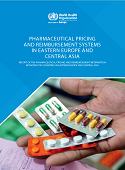Pharmaceutical pricing and reimbursement systems in Eastern Europe and Central Asia (2020)

Download
Report of the pharmaceutical pricing and reimbursement information network for countries in Eastern Europe and Central Asia
This report presents pharmaceutical policies related to pricing, purchasing and funding of medicines in 11 countries in eastern Europe and central Asia (Armenia, Azerbaijan, Belarus, Georgia, Kazakhstan, Kyrgyzstan, the Republic of Moldova, Tajikistan, Turkmenistan, Ukraine and Uzbekistan). These are among the members of a regional subgroup of the Pharmaceutical Pricing and Reimbursement Information (PPRI) network of competent authorities in the field of pharmaceutical pricing and reimbursement. They mainly provided evidence in the form of national profiles and posters, including information on access to HIV, hepatitis and tuberculosis medicines. The survey showed that seven countries have a form of price regulation in place for all or a limited number of outpatient medicines. Five of these have regulation at all price levels (with policies on the application of external price referencing mark-ups at the wholesale and pharmacy levels).
In the hospital sector, medicines are mainly procured through tendering (predominantly via central procurement) and are provided free of charge to patients. Medicines included in national government disease programmes (such as those for HIV and tuberculosis) are also provided free of charge. Other outpatient medicines are purchased by the patient either fully out of pocket or against a co-payment where medicines are part of a benefit package (reimbursement list). These reimbursement lists are quite short at the time of writing, with plans to expand them over time. This report highlights limitations in equitable access to affordable medicines caused by, among others, high and increasing out-ofpocket payments for outpatient medicines.



